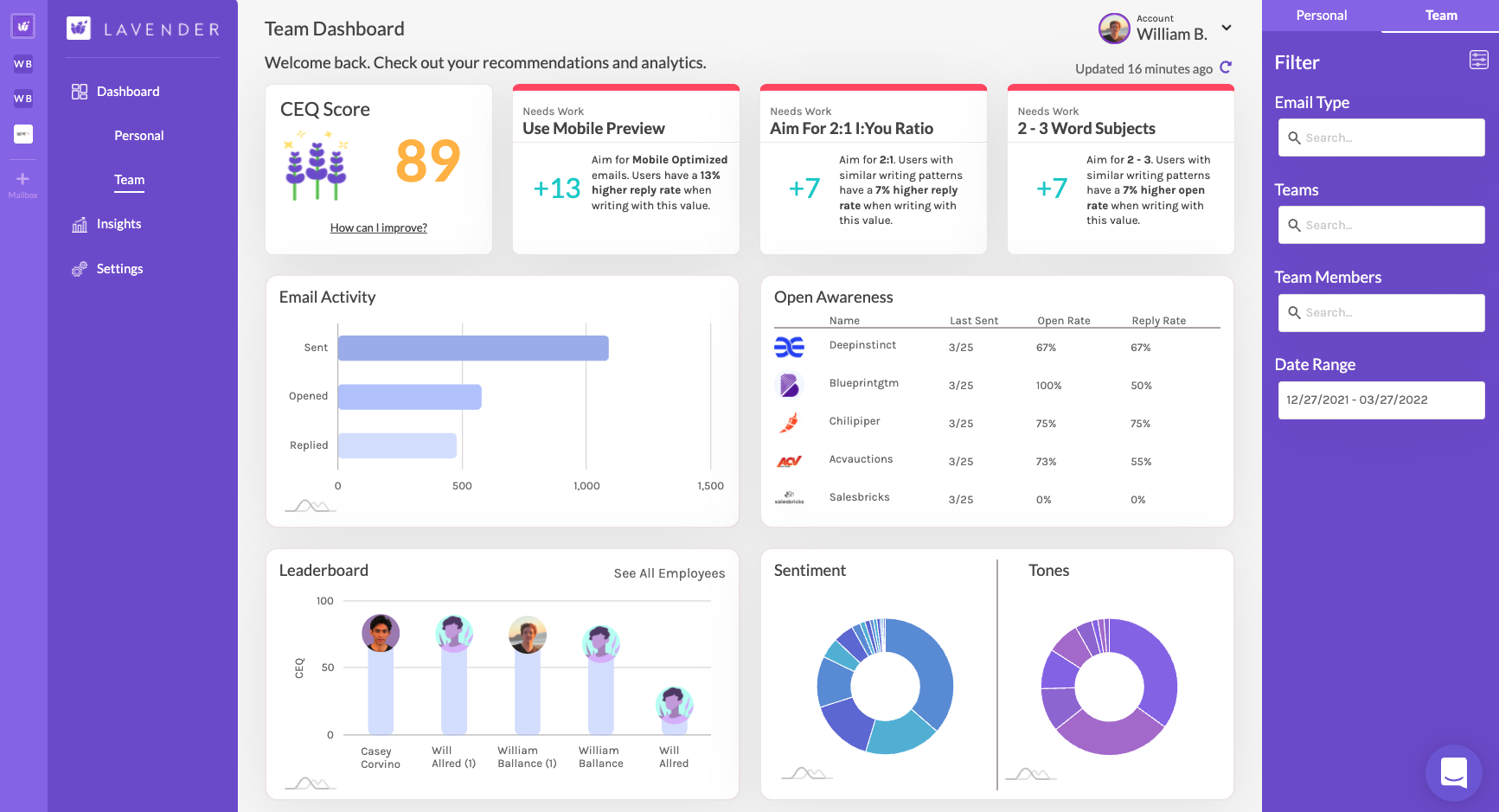Years ago, Will Allred and William Ballance were developing a tech platform, Sorter, to apply personality and communication psychology to marketing campaigns. Just as Sorter was heading to market, the pandemic hit — and marketing budgets froze. With a week of funding left, Allred and Ballance pivoted, repackaging their tech to work in Gmail in what they thought would be a brief detour to Sorter’s launch.
But users liked the repackaged product — and so did investors. So Sorter became Lavender, an AI-powered sales email coaching platform.
Lavender integrates with email providers to serve up context on a sales prospect and suggest ways to optimize the message to get a reply. Showing that there’s money in the idea, the company today announced that it raised $13.2 million across a Series A round led Norwest Venture Partners with participation from Signia Venture Partners and a seed round led by Signia with contributions from CapitalX, Position Ventures and various angel investors.
“By combining deep learning on email data with communication and behavioral psychology, Lavender’s AI writing assistant identifies and implements ways to increase reply rates,” Ballance told TechCrunch in an email interview. “In today’s climate, teams have to do more with less. While sales team sizes shrink due to layoffs, teams use Lavender to make each rep more effective and efficient.”
Lavender’s product is made up of three different components: a sales email coach, a “personalization assistant” and an email intelligence and coaching portal. The email tools provide research material (e.g. news and updates, funding stats, job listings, events, tweets and more) on recipients and can automatically create drafts from that research (à la ChatGPT), or simply generate a few bullet points to work within a preexisting email thread. As an email’s written, Lavender scores it in real time, suggesting improvements in specific areas.

“Writing a ‘better email’ is a four-step process — research, create, edit and learn — and our product helps across all four,” Ballance said. “Instead of automating, we help users write effective personalized emails faster. The AI works alongside them, but doesn’t replace them.”
Lavender’s aforementioned learning portal, meanwhile, aggregates and analyzes email activity, highlighting areas in need of improvement. Managers using Lavender can see which email templates are working versus which aren’t for instance, as well as metrics like individual email scores, open rates, reply rates and writing time.
Lavender also detects “at-risk” reps that may need additional support or coaching to meet certain goals. That’s not a feature likely to thrill every rep, particularly those who value their own processes and privacy. But Ballance makes the case that it’s a net good where an organization’s sales are at stake.
“Sales teams have become too focused on optimizing for efficiency and automation. This forced optimization has left buyers with a bad impression of sellers, because they feel as if they’re just a number,” he said. “Sales needs to go back to building real relationships — not automation and spam. Lavender makes real personalized emails faster for our users.”
While Lavender isn’t the only firm applying automation to the marketing and sales outreach segment, it’s certainly benefiting from the general boom time. According to a 2022 report from Ascend2 and Research Partners, 69% of marketers say that their overall customer journey is partially or mostly automated while 9% say that theirs is fully automated. The same report found that nearly a third — 31% — of marketing professionals planned to purchase a marketing automation solution in the next 12 months.
Lavender’s rivals include Sellscale, which similarly uses generative AI to write marketing emails, and marketing automation startup Klaviyo, which received a large investment from Shopify last August. (Ballance sees Jasper and Regie as competitors, too; both leverage text-generating AI for marketing copy drafting.) Lavender has a respectable customer base, though, totaling around 11,000 sellers at organizations including Twilio, Segment, Sendoso, Sharebite and Clari.
“We built for nearly two more years before raising venture capital,” Ballance said, declining to answer a question about recurring revenue. “Lavender is well-capitalized to continue building in the current market.
Lavender’s team recently grew to 16 employees, up from six in Q4 2022. Ballance says that the startup — which has raised $14.2 million in total to date — will continue to expand and fill “key roles” throughout the rest of the year.































Comment